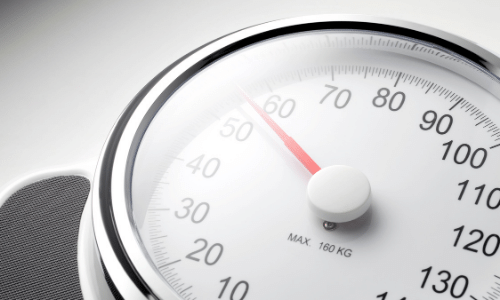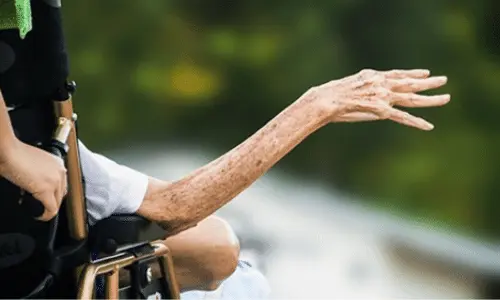Fat Loss vs Weight Loss in The Elderly
“Fat Loss vs Weight Loss in the Elderly” was written by Charlotte Fisher, a dietetic intern at Oregon Health Sciences University. Reviewed/edited by Reviewed/edited by Janina Phillips, RD, LD and Katie Dodd, MS, RDN, CSG, LD, FAND.
Body composition changes significantly throughout the lifespan and it’s important to consider stage of life when we assess individuals’ health. When it comes to the elderly, we typically see a significant loss in muscle mass, known as sarcopenia, and an increase and redistribution in fat mass (1).
When we are looking to support an elderly individual with their weight, it’s crucial to understand that not all weight loss is created equally. Understanding the difference between fat loss vs. weight loss can be extremely important in supporting the overall health of aging individuals.
Fat Loss vs Weight Loss
Our bodies are composed of a combination of muscle, water, bone and fat. The percentage of these components in our body shifts throughout life. These changes can occur more rapidly as we get older.
Weight Loss
Weight loss refers to an overall decrease in body weight. This can include a loss in any area. When you step onto a scale, the number reflects the combination of these components.
When measuring weight loss, look at trends in an individual’s weight over time is the best method. Utilizing a weight loss percentage calculator can be a great tool for looking at these trends and helping to address unintended weight loss in the elderly.
Research has shown that close to a quarter of all weight loss in older individuals results in loss of muscle mass (1). Losing muscle is never a good thing, especially in elderly individuals who typically have less muscle to begin with.
Fat Loss
When we are looking at fat loss, we are referring to loss of adipose (fatty) tissue in the body. This can be challenging to measure because methods for measuring fat can be uncomfortable, expensive, or not readily available.
The easiest way to determine fat loss at home is to notice how clothes are fitting. If you do not have a significant loss in strength and your clothes begin to fit more loosely, chances are you are losing fat.
Do I Really Need to Lose Weight?

While we’ve all heard that losing fat can possibly decrease health risks in certain overweight or obese individuals, it’s a different story when it comes to the elderly.
Believe it or not, being underweight as an older person is a greater risk factor for death than being overweight (1).
Before recommending weight loss, it’s important to determine if the person is motivated to make changes in their diet or to sustain changes over the time needed to lose the weight.
Will beginning a diet disrupt their life and increase their stress level? Will it affect their quality of life in a way that is more difficult than carrying the weight? Often changes like these are challenging for elderly individuals who are set in their habits.
While some fat loss may support healthy outcomes, in general, we don’t want to encourage elderly individuals to restrict their calorie intake and we especially don’t want to do this without proper supervision and guidance.
Assessing Weight With BMI
Please note, BMI, which refers to body mass index, is not a good way to measure weight loss or fat loss. BMI doesn’t take into account individual body composition, but gives an overall number based on weight and height.
In the elderly who have lost height due to osteoporosis, amputations, or for other reasons, BMI can overestimate fatness. Even with the imprecision of BMI, studies show that those over 65 with a BMI between 23-33 tend to have lower mortality rates.
For more information, check out the article on BMI here.
Abdominal Fat
Fat is typically redistributed to the abdominal area in the elderly. This is known as visceral fat. Visceral fat is associated with several negative health outcomes including insulin resistance, dyslipidemia (increased fat in the blood), type-2 diabetes, cardiovascular diseases and more (4).
Having excessive abdominal fat could be a reason to discuss the benefits and risks of weight loss with a health care provider.
Effects of Weight Loss
Some weight loss can have positive effects such as increased mobility and decreased symptoms from certain diseases. Weight loss in the elderly can also have negative consequences.
Unintended Weight Loss
 Weight loss can be a side effect of illness or an indicator of underlying health conditions (3).
Weight loss can be a side effect of illness or an indicator of underlying health conditions (3).
Unintended weight loss can be dangerous in the elderly.
Unintended weight loss can lead to an even greater loss of muscle mass.
Potential consequences of unintended weight loss include:
- higher risk for falls
- loss of independence
- greater likelihood of early death
Sarcopenic Obesity
Elderly individuals typically have less muscle to begin with due to sarcopenia, that natural loss of muscle mass with age. Sarcopenia obesity, the loss of lean muscle mass accompanied by an increase in fat mass, is commonly seen in the elderly (3).
Potential consequences of sarcopenia and sarcopenic obesity include:
- loss of mobility
- loss of ability to fully care for one’s self
- increased risk of injury
Losing weight without building muscle can be dangerous (2). Any elderly individuals who are working with their healthcare provider toward a goal of weight loss should focus on reducing body fat while maintaining as much muscle mass as possible.
Some loss of fat in certain people has been associated with improvements in walking speed while increased muscle mass is strongly associated with healthy mobility and function in older adults (1).
How to Support Healthy Weight in The Elderly
While the effects of obesity are a concern in today’s society, addressing this issue in the elderly requires special consideration.
Support from a Healthcare Provider
Because of the risks associated with weight loss, elderly individuals should seek professional guidance before they begin. Working with a geriatric dietitian and a physical therapist or personal trainer who is trained to work with the older population is key.
Focus on Exercise
 We want to be intentional and conscientious with any weight loss efforts.
We want to be intentional and conscientious with any weight loss efforts.
The focus should primarily be on fat loss and making sure to include physical activity to help preserve muscle and bone mass.
While exercise alone has not been found to cause weight loss in the elderly, it is important.
Both aerobic and weight bearing exercises have numerous benefits for the elderly, including:
- Improved insulin sensitivity
- Reduced fasting blood glucose
- Improved blood pressure and lipid profiles (1).
- Muscle strength
- Flexibility
- Improved gait
These benefits were highest in people who did some of each type of exercise (2,5)
Nutrition
A modest calorie reduction is the best way to achieve fat loss. Ensuring that nutrient needs are being met and goals are realistic can be difficult. As you age, your body’s ability to process certain nutrients changes and you may need help from a geriatric dietitian to prevent deficiencies.
They can also help you to manage other health conditions and advise you if weight loss is the best choice for you right now.
Adding fruits and vegetables to meals when appropriate can be a good way to stay full while reducing calories. Include protein throughout the day to help maintain and build muscle mass (2).
Support Health in Other Ways
 Weight loss may not be the best choice for you.
Weight loss may not be the best choice for you.
A dietitian can help guide your food choices to improve lab values, energy, and certain health conditions.
Working with a physical therapist or personal trainer can help you to increase your muscles, improve your endurance and strengthen muscles around your joints to keep you independent longer.
Conclusion
When it comes to elderly individuals, it is very important to understand the difference between fat loss vs. weight loss. Body composition plays a vital role in the health and outcomes for the elderly, and we want to do our best to support muscle maintenance and a decrease in fat mass when needed.
Any attempts at weight loss should be done intentionally and are best accomplished under the guidance of a trained professional, like a registered dietitian nutritionist that specializes in geriatrics.
References
- Gill, L. E., Bartels, S. J., & Batsis, J. A. (2015). Weight Management in Older Adults. Current obesity reports, 4(3), 379–388. https://doi.org/10.1007/s13679-015-0161-z
- Coker RH, Wolfe RR. Weight Loss Strategies in the Elderly: A Clinical Conundrum. Obesity (Silver Spring). 2018 Jan;26(1):22-28. doi: 10.1002/oby.21961. PMID: 29265771; PMCID: PMC5744894.
- DiMilia, P. R., Mittman, A. C., & Batsis, J. A. (2019). Benefit-to-Risk Balance of Weight Loss Interventions in Older Adults with Obesity. Current diabetes reports, 19(11), 114. https://doi.org/10.1007/s11892-019-1249-8
- Chang, S. H., Beason, T. S., Hunleth, J. M., & Colditz, G. A. (2012). A systematic review of body fat distribution and mortality in older people. Maturitas, 72(3), 175–191. https://doi.org/10.1016/j.maturitas.2012.04.004
- Villareal DT, Aguirre L, Gurney AB, Waters DL, Sinacore DR, Colombo E, Armamento-Villareal R, Qualls C. Aerobic or Resistance Exercise, or Both, in Dieting Obese Older Adults. N Engl J Med. 2017 May 18;376(20):1943-1955. doi: 10.1056/NEJMoa1616338. PMID: 28514618; PMCID: PMC5552187.
- Holmes, K. 2019, Sept 4. Fat Loss VS Weight Loss Working against Gravity. https://www.workingagainstgravity.com/articles/fat-loss-vs-weight-loss
- Miller SL, Wolfe RR. The danger of weight loss in the elderly. J Nutr Health Aging. 2008 Aug-Sep;12(7):487-91. doi: 10.1007/BF02982710. PMID: 18615231.
- Hamer M, O’Donovan G. Sarcopenic obesity, weight loss, and mortality: the English Longitudinal Study of Ageing. Am J Clin Nutr. 2017 Jul;106(1):125-129. doi: 10.3945/ajcn.117.152488. Epub 2017 May 24. PMID: 28539380.
- Dodd, Katie. 2020, May 21. BMI in the Elderly: What You Need to Know. The Geriatric Dietitian. https://thegeriatricdietitian.com/bmi-in-the-elderly/
